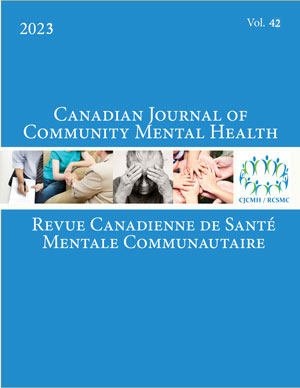Volume 42 • Number 1 • May 2023
Articles
Rural residence has been identified as a risk factor for suicide, especially for men. Little qualitative research exists on rural suicide, which might help deepen understandings of prevention strategies within rural places. Therefore, virtual focus groups were held across six Canadian provinces to give voice to rural community members and service workers about suicide prevention. Barriers to accessing services and the need to strengthen rural support networks were discussed. Enhancing peer support was highlighted as a strategy to better address the needs of rural Canadians.
We aimed to investigate non-suicidal self-injury (NSSI), help-seeking, and cultural responses to NSSI among a diverse sample of university students in Canada. NSSI prevalence was examined in a sample of students (n = 5,450; 63.9% women), which yielded a follow-up sample of ethnic minority students with a history of self-injury (n = 101; 81.2% women), to study service use and cultural responses to NSSI. Asian, Southeast Asian, White, and multiracial backgrounds were at the most risk for NSSI engagement. Three categories of responses to NSSI emerged: responses embedded in stigma, emotional, and constructive responses. Implications for cultural differences in help-seeking and attitudes towards NSSI are discussed.
A scoping review of research about suicidality in rural and remote Canadian communities, published between 2009 and July 2020 was conducted by searching Embase, Medline, CINAHL, PsychInfo, SocIndex, Geobase, and PsycArticles databases. Included articles were reviewed and charted using data extraction. Thirty-nine Canadian, non-Indigenous articles met inclusion. Most publications were based on quantitative research (23). Apart from one intervention study, articles were prevention focused, with suicidality risk and protective factors noted to be of particular interests. The most frequently referenced suicidality risk factor was rural residence. It is anticipated that results of this review will inform future research, particularly the need to include qualitative and mixed methodologies, protocol, and evaluations of interventions as well as postvention research, with further consideration of different Canadian settings and populations.
The concept of social capital may shed light on challenges experienced by employees with mental health conditions (MHC) in sustaining employment. This article presents findings from a qualitative descriptive study exploring the concept of workplace social capital and its impact on how employees with MHC negotiate workplace accommodations. The findings reveal that social capital consists of various elements that impact how accommodations are negotiated in the workplace; some are dynamic and can be built, rebuilt, and spent such as employee self-confidence, reputation, and likeability. Future research is needed to explore how social capital can be developed to facilitate the accommodation process.
Mental health peer support was one of the key recommendations of the Mental Health Commission of Canada’s Workforce Advisory Committee (Cyr et al., 2016 [2012]) and highlighted as one way to transform the mental health system in Canada. This mixed methods study explored the work experiences of mental health peer support workers across Canada and their perceptions of integration within mainstream mental health services. The findings revealed that role confusion, stigma, lack of support to practice authentically and peer drift challenged the full integration and participation of peer support workers within Canada’s mental health system. Recommendations to mitigate these challenges are suggested.
Organizational practices to advance racial equity are needed to address the systemic nature of racism. Implementation science frameworks offer a comprehensive approach when implementing complex initiatives. We describe the development of a tool to assess organizational practices in advancing racial equity (OPARE). Findings on the acceptability, reliability and preliminary validity are presented based on 98 responses from child and youth mental health agencies across Ontario. The OPARE shows promise as a valid and reliable organizational assessment tool for helping plan, implement and evaluate racial equity efforts in community mental health settings.
Practice Innovations
Canadian women with alcohol use disorder have limited access to anti-craving medication, despite its effectiveness in reducing alcohol use. This article describes the results of a pilot program developed to improve access to integrated medical assessment and management of anti-craving medication and traumainformed relapse prevention counselling in a community setting.
Police services have frequent contact with people living with mental disorders, substance misuse, or homelessness. This paper describes a specialized service within a police service in Ontario, Canada, aimed to support the needs of these vulnerable individuals. Implications for police services considering implementing a similar program are discussed.









